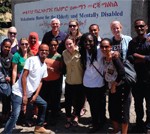When it comes to medications, balancing cost and clinical effectiveness is always a huge challenge. “Biologics are not an option for the vast majority of African patients. Not only are they expensive, but they require refrigeration, which is not always a given. Using triple therapy for the treatment of rheumatoid arthritis (e.g., methotrexate, sulfasalazine and hydroxychloroquine) does treat rheumatoid arthritis well. And while it is a much less expensive option than a biologic, the ability to monitor for toxicity is a barrier.
“Some of my colleagues in Ethiopia are trying to introduce an arrangement [in which] hospitals could negotiate with labs that monitor for methotrexate toxicity and then have a package deal that includes lab tests so that monitoring is less expensive and uniform. But there is always the ethical question: ‘Do you start someone on a medication they need if you may not be able to monitor them adequately and/or continue the medication?’”
Dr. Meltzer is in the startup phase of her new initiative, called Rheumatology for All, a 501c whose goal is to educate rheumatologists in underserved areas—starting with Ethiopia and Kenya. “We are currently raising funds and have established that training will cost roughly $20,000 per person. As for locations, we are looking at McGill University, the University of Toronto or the University of KwaZulu-Natal in Durban, South Africa.”
“In any resource-poor area, noncommunicable diseases are given a lower priority. We have to shift the thinking of those who lead these countries. … We have to get them to see that, for example, an infection is short lasting, while a chronic or immune disease left untreated can lead to premature death and cause disability for a lifetime.”
The pain and suffering caused by arthritis in Africa seems incalculable. And yet, calculate it is what we must do.
Dr. Meltzer closes with these words of wisdom, echoed by her dedicated colleagues: “We need epidemiological studies on the impact of rheumatic diseases. That way we can approach the governmental decisionmakers with hard, indisputable facts that cannot be ignored.”
Elizabeth Hofheinz, MPH, MEd, is a freelance medical editor and writer based in the Greater New Orleans area.
References
- The American College of Rheumatology. 2015 workforce study of rheumatology specialists in the United States.
- Meltzer M. Oral communication. 2017 Apr.
- Mody G. Oral communication. 2017 Apr.
- United Nations, Department of Economic and Social Affairs, Population Division. World population prospects: The 2015 revision. Key findings and advance tables.
- Mody GM. Rheumatology in Africa—challenges and opportunities. Arthritis Res Ther. 2017 Mar 7;19(1):49.
- Meltzer M, Price A. Bioethical challenges to rheumatology in resource poor areas: A review. African Journal of Rheumatology. 2017;5(1).
In Brief
Four seasoned rheumatologists share their thoughts on the prospects for treating arthritis patients in Africa, where there are too many patients, not enough doctors & a pool of meager resources that has to be shared.



